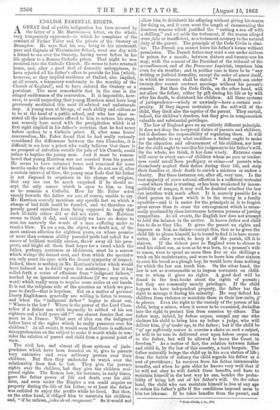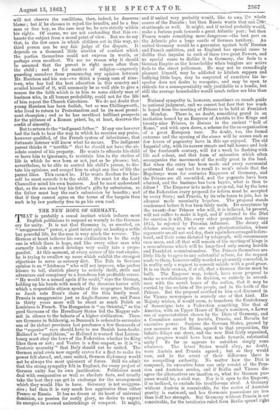considered the differences between the two Churches, it is for
the education and advancement of his children, nor how difficult to see how a priest who really believes that there is far the child ought to sacrifice his judgment to his father's wilL no prospect of salvation outside the pale of his Church, could On the whole, we think, it has done wisely. Extreme eases refuse to baptize the young man. And it must be remem- will occur to every one—of children whom no care or tender- bered that young Harrison VMS not secreted from his parent. ness could recall from profligacy or crime—of parents who. He seems to have returned home and remained for some shamelessly neglect their duties during their life, and strip months under the care of his friends. We do not see if, after their families at their death to enrich a mistress or endow a a certain interval of time, the young man finds that his father charity. But these instances are, after all, very rare. In the is not disposed to acquiesce in his change of religion, vast majority of cases natural affection is a sufficient restraint that any one can be much surprised if he should ac- —and where that is wanting, or has been weakened by incom- cept the only career which is open to him so long patibility of temper, it may well be doubted whether the law as he remains a Catholic. How far Mr. Faber acted can interfere with much effect. It is scarcely possible for a openly towards the father we are, of course, unable to say. third person to know which is in the wrong in a family Mr. Harrison scarcely mentions any specific fact on which a squabble—and it is easier for the principals in it to forgive- charge of bad faith could be founded, and we therefore ex- great errors than to erase the estrangement which is woes- pressly guard ourselves from being supposed to imply that such ill-faith either did or did not exist. Mr. Harrison sexily produced by close intercourse between persons of jarring- sider the relation of parent and child from a general point of procal rights. The Roman law, for instance' in early times, gave the father power of life and death over his chil- maintain himself in the best way he can, besides the proba- property during the life of his father, or at least the father hand, the child who can maintain himself is free at any age was entitled to enjoy the profits while he lived. But then, to refuse his father's gifts if the conditions imposed seem to ed on the other hand, it obliged him to maintain his children, him too irksome. If he takes benefits from the parent, and and, "if he refuses, Judas de ed recognoscet." So it would not * Code Chile, I. ix., 870. ENGLISH PARENTAL RIGHTS. allow him to disinherit his offspring without giving his reason for doing so, and it even went the length of enumerating the can scarcely have acted with the precipitation which is at The law of England goes on an entirely different principle. first sight implied in his father's assertion that he had never It does not deny the reciprocal duties of parents and children, before spoken to a Catholic priest. If, after some hours' but it declines the responsibility of regulating them. It will conversation, Mr. Faber found that he had really seriously not undertake to say what sacrifices a father ought to make considered the differences between the two Churches, it is for the education and advancement of his children, nor how difficult to see how a priest who really believes that there is far the child ought to sacrifice his judgment to his father's wilL no prospect of salvation outside the pale of his Church, could On the whole, we think, it has done wisely. Extreme eases refuse to baptize the young man. And it must be remem- will occur to every one—of children whom no care or tender- bered that young Harrison VMS not secreted from his parent. ness could recall from profligacy or crime—of parents who. He seems to have returned home and remained for some shamelessly neglect their duties during their life, and strip months under the care of his friends. We do not see if, after their families at their death to enrich a mistress or endow a a certain interval of time, the young man finds that his father charity. But these instances are, after all, very rare. In the is not disposed to acquiesce in his change of religion, vast majority of cases natural affection is a sufficient restraint that any one can be much surprised if he should ac- —and where that is wanting, or has been weakened by incom- cept the only career which is open to him so long patibility of temper, it may well be doubted whether the law as he remains a Catholic. How far Mr. Faber acted can interfere with much effect. It is scarcely possible for a openly towards the father we are, of course, unable to say. third person to know which is in the wrong in a family Mr. Harrison scarcely mentions any specific fact on which a squabble—and it is easier for the principals in it to forgive- charge of bad faith could be founded, and we therefore ex- great errors than to erase the estrangement which is woes- view. to the father, but will be allowed to leave the Court in law, and almost all those systems The civil ms of juris- freedom." As a matter of fact, the relation between father and child is, by the law of this country, a tacit bargain. The prudence which have been founded on it, give to parents very extensive and even arbitrary powers over their father naturally brings the child up in his own station of life ; to watch over the from the habits of infancy the child regards his father as a children. But then they undertake relationship from first last. They give the parents sort of providence ; he receives from his father innumerable to older he benefits, ows very well that if rights over the children, but they give the children reci- ts, and when he gets he will not obey he will forfeit these benefits, and have to gave the father power of life and death over his chil- maintain himself in the best way he can, besides the proba- bility of being left out of his father's will. On the other then, and even under the Empire a son could acquire no il property during the life of his father, or at least the father hand, the child who can maintain himself is free at any age was entitled to enjoy the profits while he lived. But then, to refuse his father's gifts if the conditions imposed seem to ed on the other hand, it obliged him to maintain his children, him too irksome. If he takes benefits from the parent, and will not observe the conditions, then, indeed, he deserves blame ; but if he chooses to reject the benefits, and be a free man or free boy, as the case may be, he acts strictly within his rights. Of course, we are not contending that this ex- hausts the subject from a moral point of view. But we do say that, in the few cases in which children act in this way, no third person can be any fair judge of the dispute. It depends on a thousand little niceties of conduct which the parties themselves could not express in words, or perhaps even recollect. We see no reason why it should be assumed that the parent is right more often than the child ; and as for matters of religion—expressly guarding ourselves from pronouncing any opinion between Mr. Harrison and his son—we think a young man of nine- teen, who has had the best education in this country and availed himself of it, will commonly be as well able to give a reason for the faith which is in him as some elderly man of business who, in all human probability, could not for the life of him repeat the Church Catechism. We do not doubt that young Harrison has been foolish, but so was Chillingworth, who lived to return to Protestantism and be its most promi- nent champion ; and as he has sacrificed brilliant prospects for the pittance of a Roman priest, he, at least, deserves the credit of sincerity.
But to return to the "indignant father." If any one has ever had the luck to hear the way in which he receives any praise, however qualified, of the French system of inheritance, that fortunate listener will know what he means. The indignant parent thinks it " terrible " that he should not have the ab- solute control of his property. He wants to educate his child or leave him to ignorance, to maintain him in the station of life in which he was born or not, just as he pleases ; but, nevertheless, to be able to control his child's person, to dic- tate his opinions, and compel him to adopt any line of life the parent likes. This cannot be. If he wants freedom for him- self he must concede it to the child. He must let the Lord Chancellor mind his own business. And he must understand that, as the son must buy his father's gifts by submission, so the father must buy the son's submission by benefits ; and that if they cannot agree on the terms of the bargain then each is by law perfectly free to go his own road.































 Previous page
Previous page